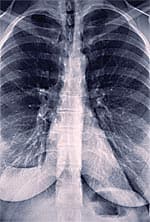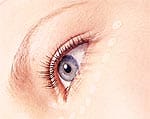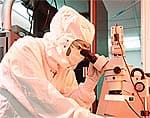Life Extension Magazine®
Deficient Vitamin D Levels Associated With Increased Heart Attack Risk | |
Men who have deficient vitamin D levels have a greater risk of myocardial infarction (heart attack) than men whose blood levels of the vitamin are sufficient, Harvard researchers reported in the Archives of Internal Medicine.* Scientists examined data from men aged 40 to 75 who participated in the Health Professionals Follow-up Study. Blood samples collected from 1993 to 1995 were analyzed for plasma 25-hydroxy-vitamin D as well as lipoprotein and triglyceride levels, and diet and lifestyle factors were ascertained via questionnaires. During 10 years of follow-up, 454 men suffered fatal coronary heart disease or non-fatal heart attack. These subjects were matched for age, smoking status, and time of blood collection with 900 men without heart disease. Adjusted analysis found that subjects with plasma vitamin D levels of ≤15 ng/mL (37 nmol/L) had a 2.42 times greater risk of heart attack compared with those whose levels were sufficient at ≥30 ng/mL (75 nmol/L). Men with intermediate vitamin D levels had a 43-60% greater risk of heart attack compared with men who had sufficient levels. Men with low levels of vitamin D were more likely to live in northern states, and less likely to be white or to use a multivitamin supplement. The authors cited vitamin D’s effect on smooth muscle cell proliferation, inflammation, vascular calcification, and blood pressure as possible protective mechanisms against myocardial infarction. “These results further support an important role for vitamin D in myocardial infarction risk,” the authors wrote. “The present findings add further support that the current dietary requirements of vitamin D need to be increased to have an effect on circulating 25-hydroxyvitamin D levels substantially large enough for potential health benefits.” —Dayna Dye | |
| Reference | |
| * Giovannucci E, Liu Y, Hollis BW, Rimm EB. 25-hydroxyvitamin D and risk of myocardial infarction in men: a prospective study. Arch Intern Med. 2008 Jun 9;168(11):1174-80. | |
Vitamin D Prolongs Breast Cancer Survival | |
Breast cancer patients with inadequate vitamin D blood levels may have poorer survival and prognosis than those with adequate levels of the “sunshine vitamin.”* In a study presented at a recent meeting of the American Society of Clinical Oncology, scientists from the University of Toronto measured vitamin D blood levels in 512 women with an average age of 50 years who had been newly diagnosed with breast cancer and tracked their progress for a median of 12 years. At the onset of the study, only 24% of women had adequate vitamin D blood levels (>29 ng/mL or 72 nmol/L) while nearly 38% had deficient levels (<20 ng/mL or 50 nmol/L). By the end of the study, vitamin D-deficient women at study entry had nearly double the risk of their disease progressing and a 73% greater risk of death compared with women who had adequate levels. The study authors noted this is “the first time that vitamin D has been linked to breast cancer progression.” They added that “vitamin D deficiency is common at breast cancer diagnosis” and emphasized blood tests to ensure adequate levels of the vitamin, especially in women with breast cancer. —Bina Singh | |
| Reference | |
| * Available at: http://www.asco.org/ASCO/ Abstracts+%26+Virtual+Meeting/Abstracts?&vmview=abst_detail_view&confID=55&abstractID=31397. Accessed June 12, 2008. | |
Inhaled Insulin Increases Lung Cancer Risk | |
A groundbreaking report by Dr. T.R. Shantha in the September 2007 issue of Life Extension warned that inhaled insulin could increase cancer risk.1 Two months later, Pfizer Pharmaceuticals, the largest maker of inhaled insulin, abruptly halted sales of its product Exubera®.2 A new study may reveal why. A review of clinical trial data shows a dramatic increase in lung cancer incidence among users of inhaled insulin.3 Insulin is a weak growth factor that may promote aberrant cell growth.1 The amount of insulin used in inhaled products is three to ten times greater than the amount diabetics use for subcutaneous injection, since little more than 10% of inhaled insulin reaches the lungs’ alveoli for systemic absorption.4,5 Dr. Shantha has long believed that inhaled insulin can act as a growth-promoting agent to encourage cancer growth in the linings of the mouth, throat, tongue, cheeks, gums, tonsils, trachea, bronchial tree, vocal cords, larynx, nose and nasal air sinuses, olfactory mucosa, and lungs. Further, Dr. Shantha believes that inhaled insulin enhances the carcinogenic effects of tobacco products and that its widespread use will dramatically increase cancer incidence. Life Extension extends its compliments to Dr. Shantha, who has warned about the potential dangers of inhaled insulin ever since it has been under development by various pharmaceutical companies. When the FDA approved the use of inhaled insulin, Dr. Shantha wrote an article reporting his suspicions of the drug’s dangers to put the product’s developer and the FDA on notice. He had no power, however, to stop the drug’s approval by the FDA and its sale to the public. Dr. Shantha personally thanked Life Extension for having the courage to publish his findings at a time when the FDA and major pharmaceutical companies assured that inhaled insulin was safe. “For three years I warned about these cancer risks and nobody listened to me except the Life Extension Foundation,” he stated. Inhaled insulin can thus be added to the long list of drugs the FDA approves as “safe,” but are then removed from the marketplace because of side-effect risks. —Alan Rosen | |
| Reference | |
| 1. Shantha TR. Unknown health risks of inhaled insulin. Life Extension. 2007 Sept;13(9):79-82. | |
Apple Extracts Prevent Stomach Damage Due to Aspirin | |
Apple polyphenol extracts protected rats from stomach damage due to aspirin in an Italian study.* Aspirin, a nonsteroidal anti-inflammatory drug (NSAID), can cause gastrointestinal problems such as bleeding and ulcers, even at the low doses given for cardiovascular health. In this study, 45 rats underwent pretreatment with apple polyphenol extracts or no pretreatment, followed by administration of aspirin to produce stomach injury. Apple polyphenol pretreatment reduced microscopic and macroscopic stomach injury by 40-45% compared with untreated rats and prevented increases in cyclo-oxygenase-2 and other damaging substances. Protection was observed after both acute and chronic aspirin injury. Apple polyphenols did not interfere with gastric acid secretion or therapeutic blood levels of aspirin. The apple polyphenol extract dosage given to the rats was equivalent to about two apples per day for a human. Using a natural food product with antioxidant effects may prove safer and cheaper than medications that inhibit gastric acid secretion, such as proton pump inhibitors. —Laura J. Ninger, ELS | |
| Reference | |
| * D’Argenio G, Mazzone G, Tuccillo C, et al. Apple polyphenol extracts prevent aspirin-induced damage to the rat gastric mucosa. Br J Nutr. 2008 May 16:1-9. | |
Anti-Aging Research Foundation Receives Charitable Status | |
| The gap between anti-aging research and its medical applications moved closer recently by the granting of a new charitable status for the Biogerontology Research Foundation (BGRF) in the UK.* The foundation, which was started with the help of some of the world’s most prominent scientists and businessmen, actively pursues research projects that target the causes of age-related disease rather than just its symptoms. By developing biotech-nological interventions to prevent or remediate the molecular and cellular deficits that accumulate with aging, the foundation addresses aging damage at its most fundamental level. Using the entire scope of modern biotechnology, the foundation represents a valuable opportunity to produce effective and lasting treatments for the diseases and disabilities of aging. For more information on the BGRF and how you can donate to the foundation, please contact Dr. Alex Zhavoronkov at alex.zhavoronkov@bg-rf.org.uk. —Bina Singh | |
| Reference | |
| * Available at: http://www.prlog.org/10078538-biogerontology-research-foundation-receives-charitable-status-from-the-charity-commission.html. Accessed June 12, 2008. | |
Lutein, DHA May Prevent Age-Related Macular Degeneration | |
Supplementation with lutein, an antioxidant, and docosahexaenoic acid (DHA), an omega-3 fatty acid, promotes beneficial changes in the eye that may help prevent age-related macular degeneration.* Lutein and DHA are important components of the macular pigment and retina, respectively. Participants were 49 women aged 60 to 80 years who were randomly assigned to take DHA (800 mg/day), lutein (12 mg/day), DHA + lutein, or placebo. The scientists chose this population because the risk of macular degeneration increases with age. The study outcome was macular pigment optical density measured in the eye after four months of supplementation. Lutein supplementation increased macular pigment density in most subjects. DHA also enhanced macular pigment density, although in other regions of the eye. DHA may exert its effects in part by boosting blood levels of beneficial high-density lipoprotein (HDL), which facilitates uptake of lutein in the eye. —Laura J. Ninger, ELS | |
| Reference | |
| * Johnson EJ, Chung HY, Caldarella SM, Snodderly DM. The influence of supplemental lutein and docosahexaenoic acid on serum, lipoproteins, and macular pigmentation. Am J Clin Nutr. 2008 May;87(5):1521-9. | |
Pygeum Africanum Extract Prevents Prostate Cancer | |
New research adds further credence to the notion that it may be possible to prevent the occurrence of prostate cancer through the regular use of botanical extracts.* Scientists at the University of Missouri-Columbia showed that an extract of Pygeum africanum is capable of inhibiting growth and inducing cellular suicide in two standard human prostate cancer cell lines in tissue culture. Furthermore, the extract was shown to sharply reduce the incidence of prostate cancer in laboratory mice genetically engineered to develop the disease. Extracts of the bark of the Pygeum africanum, or African plum, tree have been used for the control of benign prostatic hyperplasia (BPH) in Europe for a number of years, and more recently, for promotion of general prostate health and prostate cancer prevention in the United States. “Pygeum africanum…has a significant role in regulation of prostate cancer…and therefore may be a useful supplement for people at high risk for developing prostate cancer,” researchers concluded. —Dale Kiefer | |
| Reference | |
| * Shenouda NS, Sakla MS, Newton LG, et al. Phytosterol Pygeum africanum regulates prostate cancer in vitro and in vivo. Endocrine. 2007 Feb;31(1):72-81. | |










